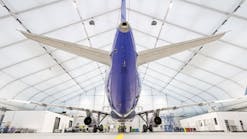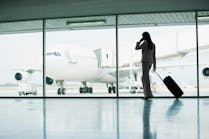Tapping into the Revenue Potential of the Digital Traveler through Smart Data Technology
Touchless technology, AI services and geolocation wayfinding – these are just a few of the ways that airports have adapted to the challenges of COVID, which forced operators to innovate the role of technology in streamlining efficiency. By taking advantage of these technologies, airports eliminated unnecessary costs while simultaneously made up for a decrease in revenue, as most travelers opted to skip common revenue-generating amenities like restaurants, gift shops, and more. Now, as air travel begins to pick up again, airport operators are faced with a new age of digital travel, and the technology equipped during a less prosperous economic time can be reimagined as a valuable source of boosted revenue.
One modern technology that will pioneer a new path of revenue for airports, and the travel industry as a whole, is recent innovations in ‘smart data’ technology. Recognized for transforming existing Wi-Fi services from an amenity with little ROI potential into a powerful analytical tool, smart data solutions have played a critical role in maximizing the monetization potential of an airport’s Wi-Fi services, while also boosting traveler satisfaction rates. With nearly all travelers equipped with at least one smart device, utilizing smart data solutions in the digital era beyond COVID can play a crucial factor in enhancing revenue opportunities for airport operations. Here are just a few ways that airport operations can utilize smart data analytics to streamline efficiency and increase profits:
Providing Personalized Service
When air travel was first introduced, airports were considered a highly anticipated touchpoint for traveling consumers. More often, however, consumers find themselves lost among thousands in an airport facility, which occasionally sacrifices comfort and personal service for speed and efficiency. This is a challenge in today’s predominately mobile world, where consumers expect instant, personalized service. As the travel industry adapts to new standards of consumer satisfaction, simply offering a mobile app with a few features does not fully resolve the demand for instant service that today's consumers expect to be tailored to their unique preferences. But the always-connected nature of today’s consumer provides airports with a vital opportunity to monetize their Wi-Fi networks in a way that promotes interactions that align with each traveler's individual interests during their airport stay. This is made possible through an integration with a smart data platform.
When a traveler logs into an airport’s Wi-Fi and opts in to the service, an advanced smart data solution will begin to compile detailed demographics and analytics on each traveler. This can include a traveler’s marital status, income level, hobbies, memberships, and more. Once compiled, the smart data platform can then use AI technology to automatically align a traveler’s profile with available services and promotions that would best fit their lifestyle preferences. Airport operators can promote restaurants and shops to the travelers most likely to consume their products; a traveler with an interest in beer can receive a notification for happy hour discounts at nearby restaurants, convincing a traveler to eat onsite. The smart data platform will continue to compile data each time a traveler logs back into the airport’s Wi-Fi, creating increasingly complete and up-to-date profiles each trip; as a traveler returns home, they can receive active promotions at an airport gift shop, encouraging travelers to purchase last-minute souvenirs for their loved ones.
Smart data solutions can remove the guesswork often associated with airport amenity marketing, a crucial pain point in the industry. By compiling complex traveler data, smart data solutions will send travelers the promotions that best match their profiles, ensuring that the appropriate target audience is always reached. Rather than overwhelming travelers with an influx of promotional messages, delivering a highly personalized smart data experience may allow travelers to be more inclined to read promotional messaging. Airport operators can increase satisfaction and meet the demands of the modern traveler, while simultaneously ensuring marketing efforts are designed to deliver a high success rate.
Boosting Localized Advertising
Airports offer the unique opportunity to provide travelers visiting a new area with local recommendations, an additional source of revenue for airport operations. In an effort to better understand their unfamiliar surroundings, travelers will be more inclined to learn about nearby services and local attractions. But simply offering localized advertisements is not enough; a young individual on a business trip most likely won’t be interested in the theme park advertisements that might pique a family’s interest. When an airport utilizes smart data solutions, however, operators can provide travelers with tailored local offerings, ensuring advertisements are most closely aligned with a traveler’s unique interests. A couple on vacation, for example, can receive the guided tour promotions that best fit their needs, and a person heavily involved in outdoor recreation may receive advertisements from local kayak rentals. Upon seeing these highly personalized opportunities, travelers will be more inclined to learn more. Each ad click also represents a vital injection of revenue that can keep airport operations funded and business profitable.
Significantly promoting reduced costs and increased revenue, leading smart data solution providers leverage strategic partnerships to provide instant access to a wide range of local advertising offers that can match any traveler interest. In providing these services, operators can also skip contracting third-party ad publishers and the costly fees associated.
Promoting Industry-Wide Opportunities
Reaching audiences, exciting interests, and converting it into actionable results can be a significant challenge, and the travel industry has long relied on partnerships between sectors to drive results. As tourism becomes an increasingly competitive field, successful operators build bridges with adjacent sectors, selecting strategic partners with whom collaboration is more important than ever. Smart data solutions further provide operators with this opportunity. When utilizing advanced smart data solutions, for example, operators can ensure hotel accommodation advertisements reach travelers whose budget and interests are closely aligned. Additionally, leading smart data solution providers have thousands of hotspots around the world enabled with their technology, including hotels, tourist attractions, public transport terminals and more, ensuring that airport operators are given continually accurate, up-to-date information throughout a traveler’s journey.
Today’s airports can provide consumers with the experience they increasingly expect. By adopting a digitalized marketing approach backed by smart data technology, airport operators can combat the common challenges faced in today’s market and provide travelers with individualized, uniquely-tailored solutions to their wants and needs. Further boosting an airport’s revenue potential, a smart data platform can ensure airports are given a competitive edge in the modern market, attracting more return travelers and ensuring that all business can generate even more revenue than ever before.
Sandy James serves as Director of Business Development- North America for Zoox Smart Data, a leading international provider of big data customer profile technology that monetizes existing Wi-Fi networks while providing the latest in personalized service. Sandy has more than 30 years of experience in working with information technology and has industry-proven expertise in technical analysis, product development, strategic planning and client relations. Sandy forms an essential part of Zoox's global leadership team with her in-depth knowledge of serving the big data needs for several vertical markets, including travel, hospitality, retail, casino and healthcare industries.






